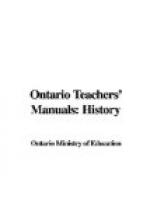Second, the pupils may be asked to illustrate, by drawings and sketch maps, historic places, routes of armies and of explorers, the journeys of settlers, etc.
HISTORY AND COMPOSITION
History, no less than other subjects of study, needs to be expressed by the pupils, if it is to make them more efficient. Some of the usual modes of expression are given above in connection with constructive work and art. The chief mode of expression, however, for history is through composition, both oral and written.
In the Junior Forms the stories should be reproduced orally (see Details of Method for Forms I and II, p. 25), either by pure narration or by dramatization; the pupils relate in their own language what they have learned, or are allowed to dramatize the story. In the dramatization, the pupils should be given a good deal of freedom in constructing the conversation, once they get to know what is wanted, the only restriction being that no pupil shall be allowed to take part who does not know the story thoroughly. Incidents such as Harold taking the oath to help William of Normandy gain the crown of England, Joseph being sold into Egypt, the Greeks using the wooden horse to capture Troy, are very easily dramatized.
In the Senior Forms the black-board outline may be used as the basis of written or oral reproduction. The subject of composition will itself be less objectionable by reason of these exercises, as the pupils are asked to reproduce the history as material valuable and interesting in itself, not merely as a means of showing their skill in expression. Moreover, in the study of history, the pupil hears or reads the compositions of others, and unconsciously gains, by these examples, much in vocabulary and in power of expression. In fact, much of the culture value of history depends on the training it affords in composition, and, by intimately connecting these two subjects, a double advantage is gained—the ability to comprehend historical material, and practice in effective expression.
HISTORY AND CHRONOLOGY OR THE USE OF DATES
Geography is one of “the eyes of history”; chronology, or the arranging of events according to their dates, is the other. This suggests that dates are to be used merely as a help in “seeing” events in history in their proper order, so that their relations to other events may be better understood. When these relations are seen, the dates lose much of their value.
For example, let us consider the following dates: 1763, 1774, 1775, 1783, 1791. The short interval between 1763, when Great Britain finally assumed control of Canada by treaty, and 1774, when the Quebec Act was passed, helps to make clear the reason for the French citizens receiving so many concessions. They outnumbered the English so much that these concessions were deemed necessary to hold their allegiance to the




